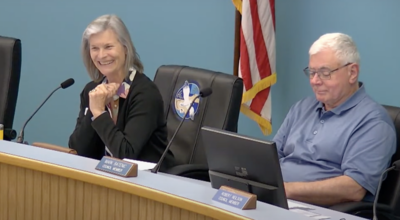Handful of races to set North Carolina legislature rule, agenda
Published 11:42 am Monday, November 2, 2020
|
Getting your Trinity Audio player ready...
|
By Gary D. Roberson and Bryan Anderson, Associated Press
Control of the North Carolina General Assembly — which carries with it the leverage to shape current policies and draw district boundaries for the next decade — likely will come down to outcomes in about 15 closely contested House and Senate races.
Democrats need to win six additional House seats and five more Senate seats to ensure majorities in the chambers held by Republicans since 2011. Flipping the Senate would only require four more seats — creating a 25-25 split — if Democrat Yvonne Holley is elected lieutenant governor, winning the right to cast tie-breaking votes in the chamber.
Democrats and their national allies have spent tens of millions of dollars since 2017 to try to take back majorities in the 120-seat House and 50-seat Senate by Election Day. Democrats won enough seats in 2018 so that Republican margins were no longer veto-proof, allowing Democratic Gov. Roy Cooper to block contentious GOP policies.
Republican supporters are responding this year by spending millions on their own, attempting to preserve their conservative-leaning accomplishments on taxes and spending, school choice, gun rights and social issues. Both sides are benefiting from independent expenditure groups whose contribution sources are often deliberately clouded.
Democrats have vowed to pass a law expanding Medicaid to hundreds of thousands of additional low-income residents if they win. State Republicans have refused to accept the Medicaid coverage offered through the 2010 federal health care law — opposition that contributed to a 2019 budget stalemate with Cooper that never got fully resolved.
“Expanding Medicaid would be the No. 1 issue,” said Senate Minority Whip Jay Chaudhuri, a Wake County Democrat. Cooper, who is seeking reelection, supports expansion. Cooper’s challenger, Republican Lt. Gov. Dan Forest, opposes it.
House Majority Leader John Bell, a Wayne County Republican, warned that a Democratic majority would approve “full-blown Medicaid expansion” that GOP lawmakers have argued would lead to cost overruns and bloated government. Democrats have said North Carolina — one of a dozen states that haven’t accepted expansion — would benefit from job creation, revitalized rural hospitals and improved health outcomes. A lawsuit seeking to overturn the 2010 health care law goes before the U.S. Supreme Court next month.
A Democratic majority would almost assuredly reexamine taxpayer-funded scholarships for K-12 children to attend private schools and slashed corporate income tax rates. Democrats would seek to boost public school spending and teacher pay beyond recent GOP increases. Candidates from both parties have said that continued COVID-19 relief will be a priority.
The winning party gets to oversee state and congressional redistricting next year based on 2020 census figures. Some Democrats have demanded that political considerations be eliminated in remapping, although there is disagreement even within the party on the details.
Redistricting in 2019 — which came after a state court concluded that partisan gerrymandering tainted maps in favor of Republicans — has boosted Democratic hopes, particularly in the Senate, where Republicans currently hold a 29-21 advantage. Two GOP seats are expected to flip due to district adjustments in Raleigh and Charlotte.
Five other closely contested Senate districts — three currently held by Republicans and two by Democrats — could determine who controls the General Assembly starting in January.
One is the 11-county northeastern 1st District, where Republican Sen. Bob Steinburg of Chowan County faces a challenge from Democrat Tess Judge of Dare County. Judge ran unsuccessfully for the House in 2016 and 2018, the first time as a replacement candidate for her husband after he died suddenly.
Judge hopes voters frustrated with state government will seek a new voice. She said Steinburg will remain in lockstep with GOP leaders if he returns to Raleigh. Health care, education and broadband access are central to her campaign.
“The people want to see change,” Judge said. “The people want their voices heard and valued in northeastern North Carolina, and that’s the candidate that I will be. I’m confident in my campaign.”
Steinburg, who previously served in the House before joining the Senate, has made prison safety a major issue after the 2017 deaths of correctional workers at a Pasquotank County prison. He described himself as in tune with constituents.
“Because I am out all the time, every day, throughout the district, I am talking to people every single day. I know what’s going on in my district,” he said. “Tess doesn’t have a clue as to what’s going on in the district.”
In the House, where Republicans hold 65 seats, a bellwether race could be in Guilford County’s 59th District. Republican Majority Whip Jon Hardister is facing Nicole Quick in his closest race since he was first elected in 2012.
Quick was one of many plaintiffs who sued over legislative maps, leading to redrawn boundaries. The district “went from leaning 12 points Republican to being a toss-up race at this point,” Quick said. Quick criticizes Republicans for failing to spend enough on public education, including in her son’s school.
If elected, Quick said she would support stronger unemployment benefits, Medicaid expansion and a cautious approach to reopening schools during the coronavirus pandemic.
Hardister said the coronavirus, state economy, education and public safety are his top priorities. He’s hopeful voters will remember the strong pre-pandemic state economy, which he believes Republicans in Raleigh fueled.
“We’ve had a setback with the pandemic, but if you want to get us back on the right track economically, then I think we need to keep Republicans in the majority,” Hardister said.
READ ABOUT MORE NEWS AND EVENTS HERE.
RECENT HEADLINES:
Greensboro police: Burglary suspect shot after he fired gun at officer
Police: 8-year-old boy accidentally shot and killed in Concord




